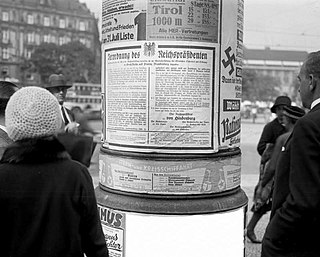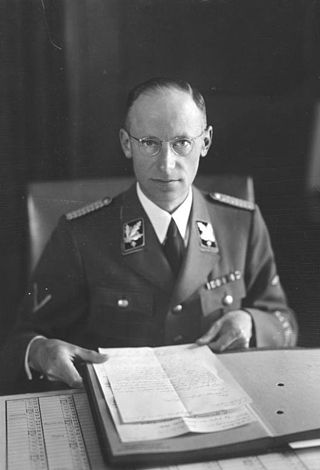 |
|---|
The below is a list of Ministers of the Ministry of Agriculture, Domains and Forests of Prussia who was often referred to as the Minister of Agriculture.
 |
|---|
The below is a list of Ministers of the Ministry of Agriculture, Domains and Forests of Prussia who was often referred to as the Minister of Agriculture.
The Prussian Minister of Agriculture, Domains and Forestry was the Minister of Agriculture of the State of Prussia. It was established in the Kingdom of Prussia in 1848 and continued to exist in the Free State of Prussia. In 1935, the ministry was merged with the Reich Ministry of Food and Agriculture. The official headquarters was in Berlin. [1]
| Name | Image | Term Start | Term End | Notes |
|---|---|---|---|---|
| Rudolf Eduard Julius Gierke |  | 1848 | 1848 | [2] [3] |
| Otto Theodor von Manteuffel |  | 1848 | 1850 | |
| Ferdinand OttoWilhelm Henning von Westphalen | 1850 | 1854 | Interim | |
| Karl Otto von Manteuffel |  | 1854 | 1858 | |
| Erdmann von Pückler | 1858 | 1862 | ||
| Heinrich Friedrich August von Itzenplitz | 1862 | 1862 | ||
| Werner Ludolph Erdmann von Selchow | 1862 | 1873 | ||
| Otto von Königsmarck | 1873 | 1873 | ||
| Heinrich Karl Julius von Achenbach |  | 1873 | 1874 | |
| Karl Rudolf Friedenthal |  | 1874 | 1879 | |
| Robert Sigmund Maria Joseph Lucius von Ballhausen |  | 1879 | 1890 | |
| Wilhelm Carl Heinrich von Heyden-Cadow | 1890 | 1894 | ||
| Ernst von Hammerstein-Loxten | 1894 | 1901 | ||
| Victor Adolf Theophil von Podbielski |  | 1901 | 1906 | Son of Eugen Anton Theophil von Podbielski |
| Johann Friedrich Bernd von Arnim Criewen |  | 1906 | 1910 | |
| Clemens August Freiherr von Schorlemer-Lieser |  | 1910 | 1917 | |
| Paul von Eisenhart-Rothe | 1917 | 1918 | ||
| Otto Braun |  | 1918 | 1921 | |
| Hermann Warmbold |  | 1921 | 1921 | |
| Hugo Wendorff | 1921 | 1925 | ||
| Heinrich Steiger | 1925 | 1932 | ||
| Alfred Hugenberg |  | 1933 | 1933 | |
| Walther Darré |  | 1933 | 1945 |

Frederick William IV, the eldest son and successor of Frederick William III of Prussia, was king of Prussia from 7 June 1840 until his death on 2 January 1861. Also referred to as the "romanticist on the throne", he was deeply religious and believed that he ruled by divine right. He feared revolutions, and his ideal state was one governed by the Christian estates of the realm rather than a constitutional monarchy.

The North German Confederation was initially a German military alliance established in August 1866 under the leadership of the Kingdom of Prussia, which was transformed in the subsequent year into a confederated state that existed from July 1867 to December 1870. A milestone of the German Unification, it was the earliest continual legal predecessor of the modern German nation-state known today as the Federal Republic of Germany.

Otto Braun was a politician of the Social Democratic Party of Germany (SPD) during the Weimar Republic. From 1920 to 1932, with only two brief interruptions, Braun was Minister President of the Free State of Prussia. The continuity of personnel in high office resulted in a largely stable government in Prussia, in contrast to the sometimes turbulent politics of the Reich. During his term of office, Prussia's public administration was reorganized along democratic lines. He replaced many monarchist officials with supporters of the Weimar Republic, strengthened and democratized the Prussian police, and made attempts to fight the rise of the Nazi Party.

Hans Luther was a German politician and Chancellor of Germany for 482 days in 1925 to 1926. As Minister of Finance he helped stabilize the Mark during the hyperinflation of 1923. From 1930 to 1933, Luther was head of the Reichsbank and from 1933 to 1937 he served as German Ambassador to the United States.

The coat of arms of Germany displays a black eagle with a red beak, a red tongue and red feet on a golden field, which is blazoned: Or, an eagle displayed sable beaked langued and membered gules. This is the Bundesadler, formerly known as Reichsadler. It is one of the oldest coats of arms in the world, and today the oldest national symbol used in Europe.

The North German Constitution, officially the Constitution of the North German Confederation was the constitution of the North German Confederation, which existed as a state from 1 July 1867 to 31 December 1870. The Constitution of the German Empire of 1871 was closely based on it.

The 1932 Prussian coup d'état or Preußenschlag took place on 20 July 1932, when Reich President Paul von Hindenburg, at the request of Franz von Papen, then Reich Chancellor of Germany, replaced the legal government of the Free State of Prussia with von Papen as Reich Commissioner. A second decree the same day transferred executive power in Prussia to the Reich Minister of the Armed Forces Kurt von Schleicher and restricted fundamental rights.

Herbert Friedrich Wilhelm Backe was a German politician and SS Senior group leader (SS-Obergruppenführer) in Nazi Germany who served as State Secretary and Minister in the Reich Ministry of Food and Agriculture. He was a doctrinaire racial ideologue, a long-time associate of Richard Walther Darré and a personal friend of Reinhard Heydrich. He developed and implemented the Operation Hunger that envisioned death by starvation of millions of Slavic and Jewish "useless eaters" following Operation Barbarossa, the 1941 invasion of the Soviet Union.

The Federal Ministry of Defence, abbreviated BMVg, is a top-level federal agency, headed by the Federal Minister of Defence as a member of the Cabinet of Germany. The ministry is headquartered at the Hardthöhe district in Bonn and has a second office in the Bendlerblock building in Berlin, which is occasionally used as a metonym to denote the entire Ministry.

Louis Rudolph Franz Schlegelberger was State Secretary in the German Reich Ministry of Justice (RMJ) who served as Justice Minister during the Third Reich. He was the highest-ranking defendant at the Judges' Trial in Nuremberg.

The Free State of Prussia was one of the constituent states of Germany from 1918 to 1947. The successor to the Kingdom of Prussia after the defeat of the German Empire in World War I, it continued to be the dominant state in Germany during the Weimar Republic, as it had been during the empire, even though most of Germany's post-war territorial losses in Europe had come from its lands. It was home to the federal capital Berlin and had 62% of Germany's territory and 61% of its population. Prussia changed from the authoritarian state it had been in the past and became a parliamentary democracy under its 1920 constitution. During the Weimar period it was governed almost entirely by pro-democratic parties and proved more politically stable than the Republic itself. With only brief interruptions, the Social Democratic Party (SPD) provided the Minister President. Its Ministers of the Interior, also from the SPD, pushed republican reform of the administration and police, with the result that Prussia was considered a bulwark of democracy within the Weimar Republic.

Gerhard "Gerd" Müller is a German politician of the Christian Social Union in Bavaria, who is currently serving as Director General of the United Nations Industrial Development Organization since 2021.

The chancellor of Germany, officially the federal chancellor of the Federal Republic of Germany, is the head of the federal government of Germany, and the commander-in-chief of the German Armed Forces during wartime. The chancellor is the chief executive of the Federal Cabinet and heads the executive branch. The chancellor is elected by the Bundestag on the proposal of the federal president and without debate.

Arnold Heinrich Albert von Maybach was a German lawyer, politician and railway manager.

The Prussian State Council was the second chamber of the bicameral legislature of the Free State of Prussia between 1921 and 1933; the first chamber was the Prussian Landtag. The members of the State Council were elected by the provincial parliaments and gave the provinces of Prussia a voice in the legislative process. The Council had an indirect right to introduce legislation, could object to bills passed by the Reichstag and had to approve expenditures that exceeded the budget.

The Reich Ministry of Food and Agriculture was responsible for the agricultural policy of Germany during the Weimar Republic from 1919 to 1933 and during the Nazi dictatorship of the Third Reich from 1933 to 1945. It was headed by a Reichsminister under whom a state secretary served. On 1 January 1935, the ministry merged with the Prussian Ministry of Agriculture, Domains and Forests, founded in 1879. Until 1938 and the Anschluss with Austria, it was called the "Reich and Prussian Ministry of Food and Agriculture". After the end of National Socialism in 1945 and of the Allied occupation of Germany, the Federal Ministry of Food and Agriculture was established in 1949 as a successor in the Federal Republic of Germany.

The Prussian State Ministry from 1808 to 1850 was the executive body of ministers, subordinate to the King of Prussia and, from 1850 to 1918, the overall ministry of the State of Prussia consisting of the individual ministers. In other German states, it corresponded to the state government or the senate of a free city.

The Prussian Ministry of Agriculture, Domains and Forestry (German: Ministerium für Landwirtschaft, Domänen und Forsten was the Ministry of Agriculture of the State of Prussia. It was established in the Kingdom of Prussia in 1848 and continued to exist in the Free State of Prussia. In 1935, the ministry was merged with the Reich Ministry of Food and Agriculture. The official headquarters was in Berlin.

The Ministry of Trade, Commerce and Public Works was a ministry in Prussia that was founded in 1848. Its beginnings date back to 1740. In 1878 it became the Ministry of Trade and Commerce by spinning off the Ministry of Public Works, which was dissolved in 1921; the responsibilities were transferred back to the Ministry of Agriculture, Domains and Forestry and of Trade and Commerce. In 1932 it became the Ministry of Economy and Labor.
(Revised version of the original version with the title Expert report "Role and content of agricultural policy and agricultural research of predecessor institutions of the Federal Ministry for Consumer Protection, Food and Agriculture" dated February 28, 2006)